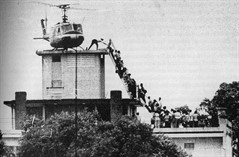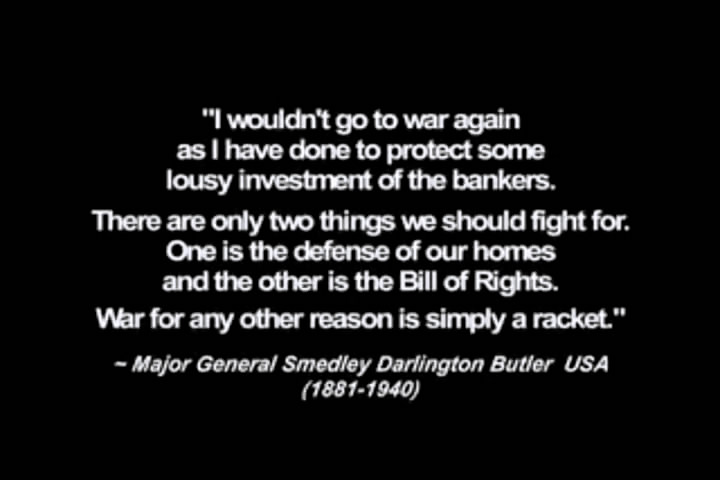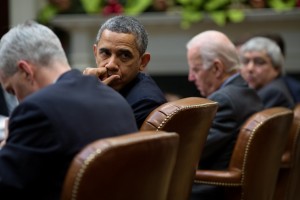It was about a year ago when the neo-cons and supporters of the military industrial complex (every Congressman with a defense contractor in their district and contributor to their re-election campaign) warned of the dire cuts to the Defense budget. It didn’t matter that they weren’t actually cuts. It was a slowing in the rate of increase. But who needs the truth when a good storyline will do.
Just as our beloved arms industry was going to see a slight drop in their obscene blood profits, a new enemy arose from nowhere. No one had ever heard of ISIS one year ago. Shitstain McCain was over in Syria taking pictures with a bunch of rag headed “freedom fighters” and Obama was trumping up false gassing charges against Assad.
We funneled arms and money to these “freedom fighters”. They have now somehow morphed into the dreaded ISIS army of beheaders. We now have Assad and ISIS as our sworn enemies, even though they are fighting each other. Turkey is our ally. The Kurds are our ally. ISIS and Turkey are fighting the Kurds. And Iran will always be our enemy. Russia is now an imminent threat to our freedom in the Ukraine.
This all makes sense. Right?
Now Obama and his new neo-con allies are committing to fight ISIS, Assad, the Taliban, Al Qaeda, Russian rebels, and the dastardly Iranians forever. That sounds cheap. The opening quote is $40 billion per year. Remember when Larry Lindsey was fired from the Bush White House when he estimated the total cost of the Iraq War would be $50 billion? The final tally will be in the $6 TRILLION range. Missed it by that much.

Do you think the initial estimate for fighting American made “terrorists” of $40 billion per year will be too high or too low? When one of our cruise missiles blows up one of the tanks we gave to Iraq, does that count as a double expense?
I always come back to who benefits from this shit. The military industrial complex is more powerful than you know. They are enriched by endless war. Peace leads to declining profits. Eisenhower was right. We didn’t listen.
“This conjunction of an immense military establishment and a large arms industry is new in the American experience. The total influence — economic, political, even spiritual — is felt in every city, every State house, every office of the Federal government. We recognize the imperative need for this development. Yet we must not fail to comprehend its grave implications. Our toil, resources and livelihood are all involved; so is the very structure of our society.
In the councils of government, we must guard against the acquisition of unwarranted influence, whether sought or unsought, by the militaryindustrial complex. The potential for the disastrous rise of misplaced power exists and will persist.
We must never let the weight of this combination endanger our liberties or democratic processes. We should take nothing for granted. Only an alert and knowledgeable citizenry can compel the proper meshing of the huge industrial and military machinery of defense with our peaceful methods and goals, so that security and liberty may prosper together.
The prospect of domination of the nation’s scholars by Federal employment, project allocations, and the power of money is ever present and is gravely to be regarded.”
Guest Post by Mike Shedlock
Defense Dept. to Request $30-40 Billion a Year to Fight ISIS; History Lessons
Anyone recall how the war in Iraq would pay for itself? That was the US Defense Department estimate in 2003.
Now some $3 trillion later (add in veterans’ benefits, depreciation of equipment, humanitarian aid, covert action, and paying for the military efforts of our coalition ‘partners’ and the Total Cost of Iraq, Afghan Wars is $4-6 Trillion.
Come Hell or High Water
That $4 to $6 trillion Iraq, Afghan cost projection was made in 2013. That estimate assumed the costs would be winding down now. They won’t.
On September 30, 2014 Vice President Joe Biden’s pledge to get out of Afghanistan “come hell or high water by 2014” came to an abrupt halt when President Obama agreed to a deal to leave US troops in the country until 2024 “at least“.
For details and an assessment of that announcement, please see “Come Hell or High Water” Promise Morphs Into “Infinity and Beyond”.
How Much Will Fighting ISIS Cost?
Boston Globe writer Linda J. Bilmes asks Fighting the Islamic State — how much will it cost?.
President Obama and his military top brass have pronounced that the effort to defeat the Islamic State will be “long” — translation: expensive. The Pentagon has admitted to spending over $1 billion so far, with the current pace running at some $10 million per day. Todd Harrison of the Center for Strategic and Budgetary Assessments believes the annual bill for military operations will range from $4 billion to $22 billion, depending on duration, scope, and the extent to which ground forces get involved — which is becoming increasingly likely. Obama has ruled out sending troops, but it is clear the Pentagon has not given up on boots on the ground — they just may not be worn entirely by Americans.
Twelve months ago, the wartime culture of “endless money,” as former Defense Secretary Robert Gates dubbed it, with its endless “emergency” funding from Congress (nearly $2 trillion in more than 30 special funding bills) — was finally coming to an end. The Beltway was filled with talk of belt-tightening at the Department of Defense, including a 10-year $497-billion cut imposed by the so-called sequester. The Pentagon was proposing to shrink the size of the armed forces, trim military compensation and benefits, and mothball expensive weapons and military installations left over from the Cold War.
But now that’s all so-last-fiscal-year. The new trend is ramping up Pentagon spending. At their press conference last week, Defense Secretary Chuck Hagel and Martin Dempsey, the Chairman of the Joint Chiefs of Staff, declared that they don’t have enough funding to conduct the operation against the Islamic State.
In addition, Congress is refusing to let the Pentagon make even modest changes to its current base benefit plan. This will surely encourage the department to ask for another blank check to pay for new operations. Requests are already mounting.
The combined cost of abandoning planned cutbacks at the Defense Department, new spending to combat the Islamic State, and extra foreign military assistance means that America will wind up spending up to $100 billion more on military activities than we had expected this year alone.
Washington assumes that we will simply borrow whatever is needed — and continue to pass the cost of today’s wars onto future generations. This feckless approach has already led to much higher national debt, as well as rampant waste and corruption in our military appropriations.
Financing the Iraq and Afghanistan conflicts with debt has hidden the true costs from public view. President Obama has just asked Americans to embark on another decade-long military engagement. He needs to propose a strategy for how it should be paid for, and what sacrifices will be required.
$100 Billion More Than Expected Already This Year Alone
Todd Harrison of the Center for Strategic and Budgetary Assessments believes the bill will “range from $4 billion to $22 billion” annually, even though we are going to spend $100 billion more this year on defense than expected.
How’s that work? I’ll tell you how: Money is pooled into an “Overseas Contingency Operation” slush fund and spent as the department wants. Moreover, veterans’ benefits, medical treatment and numerous other war costs don’t show up in any war-related buckets.
New U.S. Price Tag for the War Against ISIS: $40 Billion a Year
In a 100% guaranteed to be underestimated cost analysis, the Fiscal Times reports New U.S. Price Tag for the War Against ISIS: $40 Billion a Year.
With the war against ISIS off to a rocky start, there are signs that the Obama administration is getting ready to up the ante substantially on weaponry, manpower and aid to allies – at a cost of an additional $3o billion to $40 billion a year.
Earlier, Gordon Adams, a military analyst at American University, told The Fiscal Times that the mission to stop ISIS will cost $15 billion to $20 billion annually, based on his “back of the envelope” calculations. Other analysts have made similar forecasts. But based on soundings of the defense establishment, Adams said Thursday that the Defense Department would almost certainly request funding of twice that level later this year.
“I have consummate faith that they can get to $30 billion to $40 billion a year without breaking a sweat,” he added.
The estimated $30 billion to $40 billion of new spending would come on top of the Pentagon’s $496 billion fiscal 2015 operating budget for personnel and contractors and the roughly $58.6 billion in an “Overseas Contingency Operation” fund that is used to finance U.S. war operations in the Middle East.
The OCO, as it is known, has paid for the protracted U.S. military engagement in the Middle East with borrowing that adds to the long-term U.S. debt. If Adams’ projections are correct, then the OCO would total as much as $80 billion to $90 billion in the coming year.
However, House Speaker John Boehner and other congressional Republican leaders are skeptical that Obama’s strategy can work without substantially more resources – including more ground troops.
Iraq War: Predictions Made, and Results
Let’s take a look at previous predictions, when they were made, and how accurate they were, starting with a Christian Science Monitor report Iraq War: Predictions Made, and Results.
Ahead of and shortly after the US invasion of Iraq in 2003, a number of officials, including former Defense Secretary Donald Rumsfeld and his deputy Paul Wolfowitz suggested the war could be done on the cheap and that it would largely pay for itself. In October 2003, Rumsfeld told a press conference about President Bush’s request for $21 billion for Iraq and Afghan reconstruction that “the $20 billion the president requested is not intended to cover all of Iraq’s needs. The bulk of the funds for Iraq’s reconstruction will come from Iraqis — from oil revenues, recovered assets, international trade, direct foreign investment, as well as some contributions we’ve already received and hope to receive from the international community.”
In March 2003, Mr. Wolfowitz told Congress that “we’re really dealing with a country that could finance its own reconstruction.” In April 2003, the Pentagon said the war would cost about $2 billion a month, and in July of that year Rumsfeld increased that estimate to $4 billion.
I believe we all know how that turned out.
Lost Cause
On July 24, 2010 I wrote Afghanistan is a “Lost Cause”; Leaked Documents Show Futility of Afghanistan War
The questions on my mind are: How many trillions of dollars do we have to spend, how many lives need to be wasted, and how much longer are we going to be involved in the boondoggle known as Afghanistan?
The total amount of the waste and lives lost is unknown, but we now have an answer to my 2010 question: “how much longer are we going to be involved in the boondoggle known as Afghanistan?“.
The unfortunate answer is “until 2024 at least“.
How much will fighting ISIS it really cost? No one can answer that now, but a safe starting point for discussion is somewhere between 10 and 100 times initial projections.
Time for Self Assessment
In Iraq Splinters Into Pieces, Al Qaeda in Control of Several Cities, Kurds Take Oil City Kirkuk; Thank George Bush and the Neocons; Iraq Before and After I held the Bush Administration largely responsible for this mess.
Sure, president Obama made many mistakes but the initial, most damning mistake was the Iraq invasion and the overthrow of Saddam Hussein.
In a follow-up post, Assessing the Blame for Iraq: Bush, Obama, McCain, Others; Iraq Sunken Costs I asked for self-assessment.
Time for Self Assessment
I can and do blame Obama for countless things. But Republicans would be very wise to self-assess on Iraq, on nation building, and on warmongering in general.
Instead of self-assessment, warmongers want more war.
Deficit-Hawk Hypocrites
As is always the case, John McCain leads the war rally cry in the Senate. In the House, Speaker John Boehner Says U.S. may have ‘no choice’ on combat troops.
Not once have these Republican deficit-hawk hypocrites said how they propose to pay for this. Not once has McCain ever placed the blame for ISIS where it belongs.
ISIS a U.S. Creation
ISIS is 100% a US creation. ISIS arose following inane US nation-building policies starting with the absurd belief the “Iraq war would pay for itself.
This self-made mess produced Strange Bedfellows: To Fight ISIS, US Now Supports Iranian Revolutionary Guard, Other Terror Groups.
I concluded “Strange Bedfellows” with a warning “Just remember … To make matters worse, you have to begin somewhere.”
History Lesson
I conclude this post with another history lesson: “No mess is ever so big that it cannot be made worse by throwing more money at it.”
Mike “Mish” Shedlock
http://globaleconomicanalysis.blogspot.com
Read more at http://globaleconomicanalysis.blogspot.com/2014/10/defense-dept-to-request-30-40-billion.html#LysFD3iEcecQxF6f.99




 One month ago today, President Obama was
One month ago today, President Obama was 






